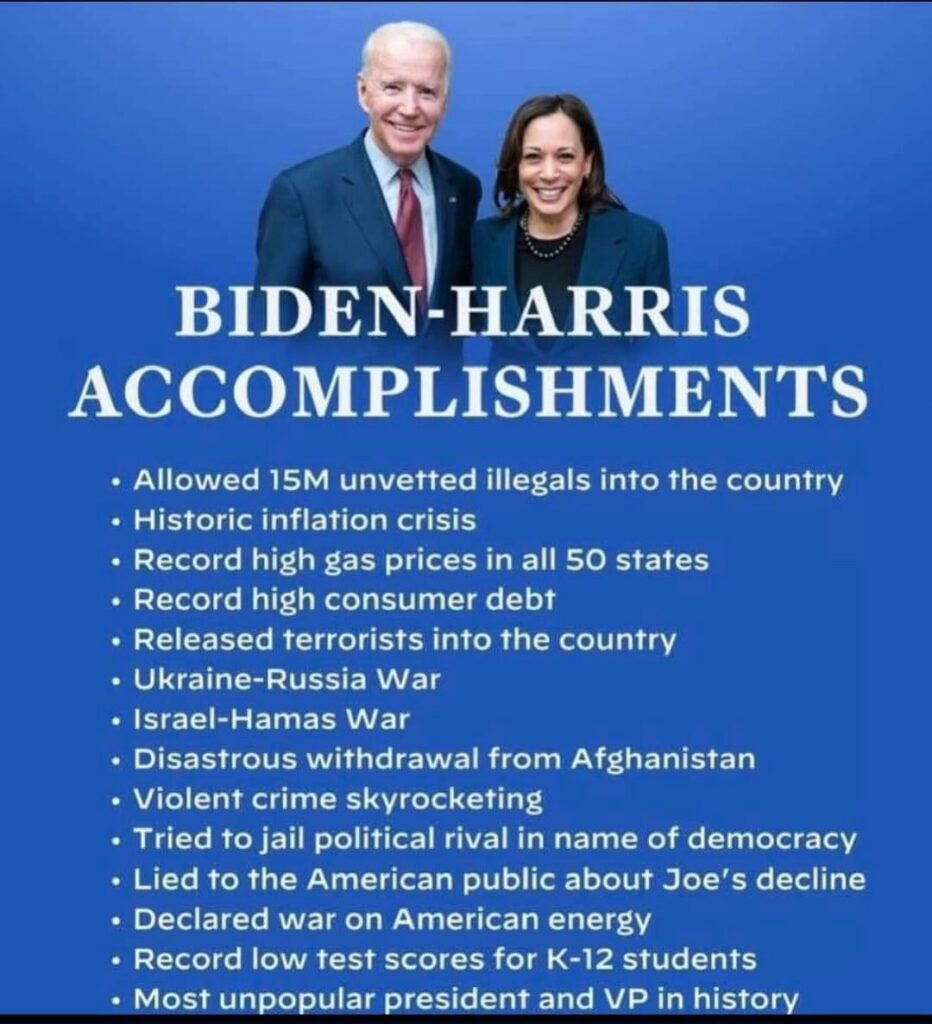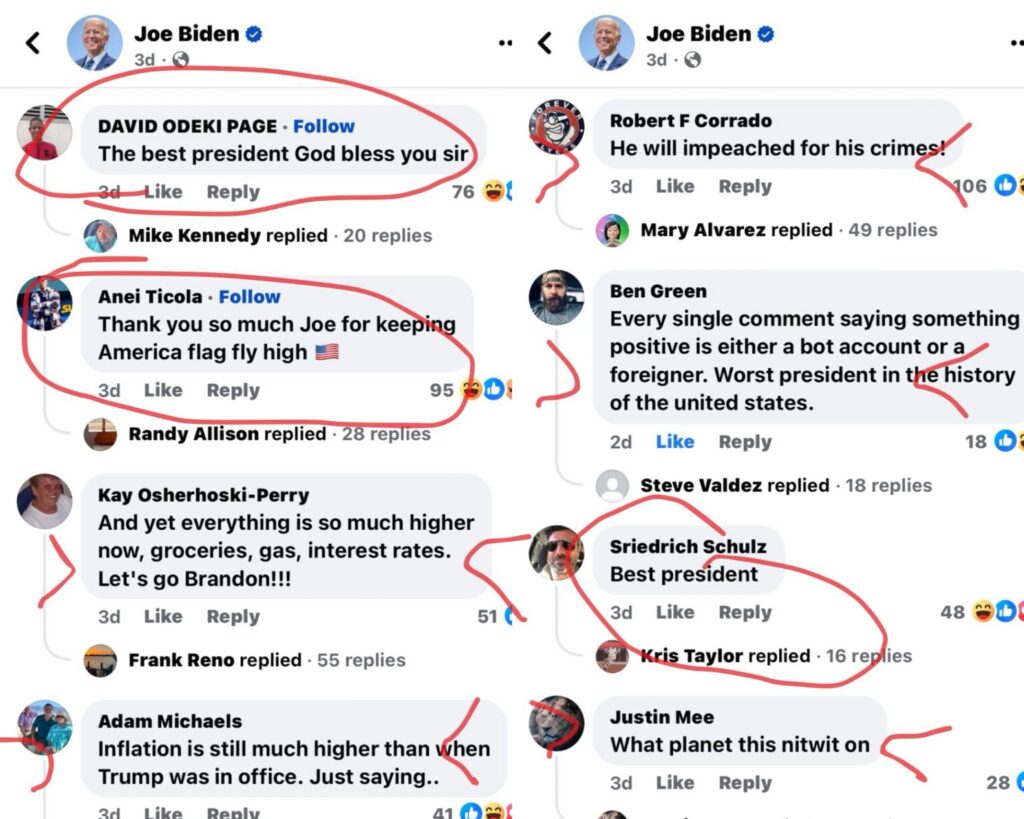
The Biden-Harris administration has faced an array of challenges and controversies since taking office, with many critics arguing that their policies have led to significant setbacks for the country. From economic struggles to foreign policy failures, the current administration’s decisions have sparked widespread debate and concern. This article aims to explore the perceived impact of the Biden-Harris administration, focusing on key issues such as immigration, the economy, foreign policy, crime, energy, and education.
As we delve into each of these areas, we will examine the policies that have defined the administration’s approach and analyze their consequences for the American people. In doing so, we will also reference related discussions and viewpoints, such as the role of Vice President Kamala Harris in shaping immigration policy and how energy decisions have influenced cultural and economic shifts. By the end of this article, readers will have a comprehensive understanding of the administration’s legacy and its impact on the nation’s trajectory.

Illegal Immigration: Unvetted Entry and National Security Concerns
One of the most contentious issues facing the Biden-Harris administration has been its approach to immigration. Critics claim that the administration has allowed approximately 15 million unvetted immigrants to enter the United States, raising significant concerns about national security and border control.
The Border Crisis and Public Concerns
The situation at the southern border has been described as a crisis by many observers, with reports of large numbers of individuals crossing into the country without adequate vetting. This has led to fears about the potential entry of criminals, terrorists, and individuals who may pose a threat to public safety. The administration’s policies, perceived as lenient, have been accused of exacerbating this issue by reducing deterrence and enforcement measures that were previously in place.
Furthermore, the surge in illegal crossings has overwhelmed border facilities, creating humanitarian concerns as well. Overcrowding, inadequate medical care, and the separation of families have become focal points of criticism. These challenges highlight the complexity of the immigration issue and the need for comprehensive solutions that balance security with compassion.
Policy Decisions and Their Impact
The administration’s decision to reverse certain immigration policies from the previous administration has been a topic of heated debate. For example, the rollback of the “Remain in Mexico” policy, which required asylum seekers to wait outside the U.S. while their cases were processed, is seen by critics as a move that has encouraged more individuals to attempt entry without legal documentation.
The role of Vice President Kamala Harris in handling the immigration crisis has also been scrutinized. Harris was tasked with addressing the “root causes” of migration from Central America, yet critics argue that tangible progress has been limited. For more insights on her influence and potential impact, consider reading the article Why Kamala Harris Would Be a Disaster for America: Key Concerns, which explores her policy decisions and leadership challenges.

National Security Implications
The potential security risks associated with unvetted entry are a significant concern for many Americans. There are fears that individuals with criminal backgrounds or affiliations with terrorist organizations could exploit lax border policies to enter the U.S. This has led to calls for stricter enforcement and better screening processes to ensure that those entering the country do not pose a threat.
Moreover, the perception of a porous border can undermine public confidence in the government’s ability to protect its citizens. This issue has become a focal point in political debates, highlighting the need for effective leadership and policy-making that prioritize national security.

Economic Struggles: Inflation, Gas Prices, and Consumer Debt
The economic landscape in the United States has been marked by significant turbulence under the Biden-Harris administration. Critics point to historic inflation levels, skyrocketing gas prices, and record-high consumer debt as indicators of economic mismanagement and policy failure. Let’s delve into these pressing issues and their impact on American households.
Historic Inflation Crisis
Inflation has reached levels not seen in decades, eroding purchasing power and straining household budgets across the country. According to the U.S. Bureau of Labor Statistics, inflation rates have surged, impacting the cost of essential goods and services, including food, housing, and healthcare. The Biden administration’s fiscal policies, including massive government spending packages, are often cited as key contributors to this inflationary pressure.
Critics argue that these spending policies, coupled with supply chain disruptions and labor shortages, have fueled inflationary trends that disproportionately affect low- and middle-income families. The rising cost of living has become a significant concern for millions of Americans struggling to make ends meet.
Record-High Gas Prices
Under the Biden-Harris administration, gas prices have soared to record highs in all 50 states, further exacerbating financial strain on consumers. The national average price of gasoline has surpassed previous records, with many drivers paying over $4 per gallon at the pump.
Several factors have contributed to this surge in gas prices, including global supply chain issues, geopolitical tensions, and the administration’s energy policies. The decision to cancel the Keystone XL pipeline and impose stricter regulations on domestic oil production has been criticized for limiting supply and driving up costs. This issue is closely tied to broader debates about climate policy and energy independence, as discussed in the article on climate predictions and tax impacts, which examines the financial burdens imposed by environmental regulations that may not always yield promised benefits.
Rising Consumer Debt
Another economic challenge facing the Biden-Harris administration is the increase in consumer debt. As inflation and high prices persist, many Americans have turned to credit to cover basic expenses, leading to record levels of debt. According to the Federal Reserve, consumer debt has reached over $4 trillion, encompassing credit card balances, auto loans, and student loans.
This rising debt burden poses a threat to economic stability and personal financial security. Critics argue that the administration’s policies have not adequately addressed the root causes of this issue, such as wage stagnation and job insecurity. Instead, temporary relief measures, like stimulus checks and extended unemployment benefits, have provided only short-term solutions without tackling underlying economic vulnerabilities.
Policy Implications and Future Outlook
The economic struggles faced by the Biden-Harris administration underscore the need for effective policy solutions that address both immediate challenges and long-term growth. Restoring energy independence, stabilizing inflation, and reducing consumer debt are crucial steps toward revitalizing the economy.
Additionally, fostering job creation and ensuring equitable access to opportunities can help rebuild public confidence in the administration’s economic agenda. By learning from past missteps and implementing targeted reforms, there is potential to mitigate the adverse effects of these economic challenges.

Foreign Policy Failures: Global Conflicts and Their Impact
Foreign policy is a critical area where the Biden-Harris administration has faced intense scrutiny. The handling of international conflicts and strategic decisions has led to widespread criticism and questions about the administration’s competence and priorities on the global stage. Let’s examine the key foreign policy challenges and their implications for U.S. international relations.
The Ukraine-Russia War
The Ukraine-Russia conflict has been a significant test for the Biden administration, highlighting complex geopolitical challenges and the delicate balance of global diplomacy. Russia’s invasion of Ukraine in February 2022 sparked a major international crisis, and the Biden administration’s response has been criticized for being reactive rather than proactive.
Critics argue that the administration’s reliance on sanctions and diplomatic pressure has failed to deter Russian aggression, leaving Ukraine vulnerable and escalating tensions with Moscow. Additionally, the conflict has strained U.S. relations with European allies, as differing strategies and interests have led to disunity within NATO.
The ongoing war has also exacerbated global economic issues, including energy shortages and rising food prices, further impacting American consumers. As a result, many question whether the administration’s foreign policy approach adequately prioritizes U.S. interests and security.
The Israel-Hamas War
Another area of concern is the administration’s handling of the Israel-Hamas conflict. The violence that erupted in May 2021 between Israel and Hamas drew international attention and highlighted the complexities of Middle East diplomacy. The Biden administration’s response was viewed by some as inconsistent, failing to clearly support Israel, a key U.S. ally, while also not effectively addressing the underlying issues that fuel the conflict.
The administration’s efforts to broker peace were seen as limited, with temporary ceasefires offering only short-lived relief. This has raised questions about the administration’s commitment to a long-term solution and its ability to navigate the intricate dynamics of the Middle East.
Disastrous Withdrawal from Afghanistan
The withdrawal of U.S. troops from Afghanistan in August 2021 marked one of the most controversial moments of the Biden administration. The chaotic evacuation, marked by scenes of desperation at Kabul’s airport, was widely criticized as a strategic failure. The rapid takeover by the Taliban and the abandonment of Afghan allies highlighted significant flaws in planning and execution.
Critics argue that the administration underestimated the speed of the Taliban’s advance and failed to secure the safety of U.S. citizens and Afghan partners. The withdrawal has been described as a humanitarian disaster, with thousands left vulnerable to Taliban reprisals. Furthermore, the event has damaged U.S. credibility on the world stage, raising concerns about America’s commitment to its allies.
Release of Terrorists into the Country
Another contentious issue is the claim that the administration has allowed the release of terrorists into the country. Reports of detainees being released from Guantanamo Bay and concerns about inadequate vetting processes for refugees and immigrants have fueled fears about national security. These actions are seen by some as jeopardizing the safety of American citizens and undermining efforts to combat terrorism.
Implications for U.S. Foreign Policy
The perceived failures in handling these international conflicts have significant implications for U.S. foreign policy. They highlight the need for a coherent and strategic approach that prioritizes national security and global stability. Building strong alliances, maintaining credible deterrence, and effectively addressing humanitarian concerns are essential components of a successful foreign policy agenda.
Moreover, the administration’s foreign policy challenges underscore the importance of restoring trust and confidence in U.S. leadership on the global stage. To achieve this, the administration must demonstrate a clear vision and commitment to safeguarding American interests while engaging constructively with international partners.

Crime and Public Safety: Rising Violence Across America
The Biden-Harris administration has been under scrutiny for the rising violent crime rates in major cities across the United States. Many critics argue that the administration’s policies have contributed to an increase in crime, raising concerns about public safety and the effectiveness of law enforcement. Let’s explore the factors behind this surge in violence and examine how the administration has addressed these challenges.
The Surge in Violent Crime
In recent years, violent crime rates have increased significantly in cities such as Chicago, New York, Los Angeles, and others. Reports indicate a rise in homicides, assaults, and armed robberies, leading to a heightened sense of fear and insecurity among residents. According to the FBI’s Uniform Crime Reporting Program, homicides have increased by over 30% since 2019, marking one of the largest spikes in decades.
Several factors have been cited as contributing to this surge in crime:
- Police Reform and Defunding: The push for police reform and calls to defund the police have been divisive issues. While reform advocates seek to address systemic racism and improve accountability within law enforcement, critics argue that reduced funding and support for police departments have led to decreased morale and a reduced presence on the streets, emboldening criminals.
- Economic Struggles: Economic challenges, exacerbated by the COVID-19 pandemic, have also been linked to rising crime rates. Unemployment, poverty, and lack of access to resources can create conditions that foster criminal activity.
- Gun Violence: The proliferation of firearms and the ease of access to guns have further fueled violent crime, prompting debates over gun control measures and Second Amendment rights.
The Administration’s Approach to Crime Prevention
The Biden-Harris administration has outlined several initiatives aimed at addressing rising crime rates, but these efforts have faced criticism for being insufficient or misdirected. Key components of their approach include:
- Community-Based Strategies: The administration has emphasized the importance of community policing and funding programs that aim to build trust between law enforcement and local communities. While these initiatives are intended to create safer neighborhoods, critics argue that they lack the immediate impact needed to curb violent crime effectively.
- Gun Control Measures: President Biden has advocated for stricter gun control laws, including universal background checks and bans on assault weapons. While these measures have been praised by gun control advocates, they have faced opposition from Second Amendment supporters who argue that such laws infringe on constitutional rights.
- Addressing Root Causes: The administration has sought to tackle the root causes of crime by investing in education, job training, and mental health services. While these long-term strategies are essential for reducing crime, they may not address the immediate challenges posed by the current crime wave.
Public Perception and Response
The rising crime rates have led to growing dissatisfaction with the administration’s handling of public safety. Many Americans feel that their communities are less safe, and the perception of lawlessness has fueled calls for stronger law enforcement measures.
Communities across the country are seeking ways to restore safety and security, often turning to grassroots efforts and local initiatives to combat crime. This includes promoting values and social cohesion, as reflected in cultural expressions like the “Jesus is King” t-shirt. Such merchandise represents a desire to uphold moral standards and foster community resilience in the face of adversity.
The Need for Effective Leadership
Addressing the surge in violent crime requires strong leadership and a balanced approach that combines effective law enforcement with community engagement and support. The administration must prioritize policies that ensure the safety of citizens while also addressing the systemic issues contributing to crime.
By building partnerships with local governments, law enforcement agencies, and community organizations, the Biden-Harris administration can work towards creating a safer environment for all Americans. Success in this area will be crucial for restoring public confidence and demonstrating a commitment to protecting the nation’s communities.

Political Controversies and Public Perception
The Biden-Harris administration has been embroiled in several political controversies that have significantly impacted public perception. From allegations of misusing power against political rivals to concerns about President Joe Biden’s health and transparency, these controversies have fueled criticism and debate. Let’s explore the key issues shaping the administration’s public image.
Allegations of Targeting Political Rivals
One of the most contentious accusations leveled against the Biden administration is the alleged attempt to use governmental power to target political rivals. Critics claim that the administration has sought to undermine former President Donald Trump through investigations and legal challenges that some argue are politically motivated.
This perceived weaponization of the justice system has led to widespread debate about the ethical boundaries of political power. The notion of imprisoning a political opponent under the guise of democracy has raised alarms among those who fear the erosion of democratic norms and the potential abuse of power.
These concerns are echoed in discussions about the broader implications of political rivalry and its impact on American democracy. For a deeper dive into these issues, consider exploring articles like Analyzing Social Media Interactions on Joe Biden’s Fishy Facebook Account, which examines how online narratives shape public opinion and influence political dynamics.
Public Perception of Joe Biden’s Health
Another significant concern for many Americans is President Joe Biden’s health and cognitive ability. Speculation about his mental acuity and physical fitness has been a recurring theme in media coverage and public discourse. Videos and images of the President appearing to struggle with speeches or engage in confusing exchanges have only fueled these suspicions.
The administration has been criticized for a perceived lack of transparency regarding Biden’s health, leading to a trust deficit among some segments of the public. This issue has become a focal point in discussions about the President’s ability to effectively lead and fulfill the demands of his office.
Popularity and Public Approval
Polls consistently show that both President Biden and Vice President Kamala Harris face challenges with low approval ratings. This trend reflects widespread dissatisfaction with their handling of key issues, including the economy, immigration, and foreign policy. In some surveys, Biden’s approval ratings have fallen to historic lows, making him one of the most unpopular presidents in recent history.
Vice President Harris has also faced criticism for her perceived lack of impact and leadership, particularly regarding her role in addressing the immigration crisis. Articles like Why Kamala Harris Would Be a Disaster for America: Key Concerns explore the potential implications of her vice presidency and public perception.
The Impact of Social Media and Public Discourse
In today’s digital age, social media platforms play a crucial role in shaping public perception and political narratives. The Biden administration’s interactions on platforms like Facebook and Twitter have been scrutinized for transparency and authenticity, often serving as a battleground for competing narratives.
Social media not only amplifies controversies but also provides a platform for both supporters and critics to voice their opinions. This dynamic creates an environment where public perception can be rapidly influenced and where misinformation can spread quickly.
The Need for Transparency and Accountability
To address these controversies and improve public perception, the Biden-Harris administration must prioritize transparency and accountability. Open communication with the public, honest acknowledgment of challenges, and a commitment to ethical governance are essential for rebuilding trust and confidence.
Restoring public faith in leadership requires not only addressing immediate concerns but also demonstrating a long-term commitment to upholding democratic values and principles. By fostering a culture of integrity and accountability, the administration can work towards repairing its reputation and strengthening its relationship with the American people.

Energy Policies: The War on American Energy
The Biden-Harris administration’s approach to energy policy has been marked by significant shifts aimed at addressing climate change, but these changes have also sparked considerable controversy. Critics argue that the administration has declared a “war on American energy,” negatively impacting domestic production and leading to economic challenges. Let’s examine the implications of these policies on the energy sector, jobs, and the broader economy.
Shifts in Energy Policy
Upon taking office, President Biden made it clear that addressing climate change would be a top priority. This commitment has led to the implementation of policies designed to reduce carbon emissions and transition the U.S. toward cleaner energy sources. Key policy changes include:
- Cancelation of the Keystone XL Pipeline: One of Biden’s first actions as president was to revoke the permit for the Keystone XL pipeline, a project that aimed to transport crude oil from Canada to the U.S. Critics argue that this decision eliminated thousands of jobs and reduced energy independence.
- Moratorium on New Oil and Gas Leases: The administration also imposed a temporary moratorium on new oil and gas leases on federal lands, aiming to reduce fossil fuel extraction and promote renewable energy. However, this move has faced backlash for potentially stifling domestic energy production and increasing reliance on foreign oil.
- Stricter Emissions Regulations: Biden has pushed for stricter emissions standards for vehicles and industries, aligning with global efforts to combat climate change. While these regulations are intended to reduce the environmental impact, they have sparked concerns about increased costs for businesses and consumers.
Impact on Jobs and the Economy
The administration’s energy policies have had mixed effects on the economy and job market. Critics argue that the shift away from fossil fuels has led to job losses in traditional energy sectors, such as oil, gas, and coal. These industries, which have been the backbone of many local economies, are now facing uncertainty as the government prioritizes renewable energy investments.
Supporters of the administration’s approach contend that the transition to clean energy will create new job opportunities in emerging sectors, such as wind and solar power. However, the timing and scale of these opportunities remain uncertain, leaving many workers in traditional energy industries without clear pathways to employment.
The economic implications of these policies extend beyond the energy sector. Rising energy costs, fueled by reduced domestic production and increased regulatory pressures, have contributed to broader inflationary trends, affecting the cost of living for everyday Americans.
Cultural and Political Implications
The administration’s energy policies have not only economic ramifications but also cultural and political ones. The emphasis on green energy has become a symbol of the broader cultural shift toward environmental consciousness, influencing public discourse and consumer behavior.
For example, the “This is My Pride Flag” t-shirt reflects how political decisions and cultural values intersect. Merchandise like this represents a growing awareness of social and environmental issues, highlighting the complex relationship between policy, identity, and public expression.
The Balance Between Environmental Goals and Economic Realities
The Biden-Harris administration faces the challenge of balancing ambitious environmental goals with the practical realities of economic stability and energy security. While the push for renewable energy is a crucial step in addressing climate change, it must be accompanied by policies that ensure a just transition for workers and communities dependent on traditional energy sectors.
Achieving this balance requires thoughtful policy-making that considers the diverse needs of the American population, including those affected by economic transitions and energy costs. By fostering innovation and supporting both traditional and renewable energy industries, the administration can work towards a more sustainable and prosperous future.

Education Crisis: Declining Test Scores and Educational Challenges
The education sector in the United States is facing significant challenges under the Biden-Harris administration, as evidenced by declining test scores and increasing concerns about the effectiveness of current education policies. The administration’s approach to education has sparked debate about priorities, funding, and the long-term impact on future generations.
Declining Test Scores
Recent reports indicate a troubling decline in test scores among K-12 students across the country. According to the National Assessment of Educational Progress (NAEP), often referred to as the “nation’s report card,” reading and math scores have seen significant drops. This decline is especially pronounced among students from low-income backgrounds and those who have faced disruptions in learning due to the COVID-19 pandemic.
Critics argue that the administration’s response to the pandemic, including prolonged school closures and shifts to remote learning, has exacerbated educational disparities. The lack of adequate support for teachers, students, and parents during this transition has left many struggling to adapt to new learning environments.
Challenges in Policy Implementation
The Biden-Harris administration has introduced several initiatives aimed at addressing these educational challenges. However, their implementation has faced hurdles that have hindered their effectiveness:
- Funding Disparities: While the administration has pledged significant funding for education, critics argue that the allocation of resources has been uneven, with some districts receiving more support than others. This disparity has perpetuated existing inequalities in educational opportunities.
- Curriculum Changes: Efforts to modernize curricula and incorporate social-emotional learning have been met with mixed reactions. While some educators praise the focus on holistic development, others argue that these changes distract from core academic subjects and fail to address the root causes of declining test scores.
- Standardized Testing: The role of standardized testing in assessing student performance remains a contentious issue. The administration’s stance on testing has shifted, leading to confusion and inconsistency in how educational outcomes are measured and addressed.
The Role of Teachers and Parental Involvement
Teachers play a critical role in shaping educational outcomes, yet they face significant challenges, including low pay, high stress, and inadequate support. The administration’s policies must prioritize teacher recruitment, retention, and professional development to ensure that educators are equipped to meet the needs of diverse student populations.
Parental involvement is another key factor in student success. The shift to remote learning highlighted the importance of engaging parents in their children’s education. However, the administration’s efforts to foster this involvement have been inconsistent, leaving many families feeling disconnected from the educational process.
Long-Term Implications for Future Generations
The current educational challenges have far-reaching implications for the future of American society. As students fall behind in key subjects like math and reading, they face increased barriers to higher education and employment opportunities. This educational gap can perpetuate cycles of poverty and limit social mobility, ultimately impacting the nation’s economic growth and competitiveness.
Addressing these issues requires a comprehensive approach that prioritizes student needs, supports teachers, and engages communities. By investing in equitable education policies and addressing the systemic factors contributing to declining test scores, the administration can work toward a more inclusive and effective education system.
For those interested in exploring related social and cultural themes, consider checking out products like the Jesus is King T-shirt, which resonates with values of faith and community engagement.

Reflecting on the Biden-Harris Legacy
The Biden-Harris administration has faced an array of challenges and controversies that have shaped its legacy and impacted the United States’ social, economic, and political landscape. From issues of national security and foreign policy to economic struggles and educational setbacks, the administration’s policies have been a focal point for debate and criticism.
Summary of Key Issues
Immigration and National Security: The administration’s approach to immigration has led to concerns about border security and national safety, as discussed in the article on Kamala Harris and key concerns for America. With millions of unvetted immigrants entering the country, critics argue that the administration has failed to prioritize the safety and security of American citizens.
Economic Challenges: Historic inflation, rising gas prices, and consumer debt have placed significant financial strain on households across the nation. The administration’s policies on climate change and energy have further fueled these economic issues, as highlighted in discussions about climate predictions and tax impacts.
Foreign Policy: The administration’s handling of international conflicts, including the Ukraine-Russia war and the withdrawal from Afghanistan, has raised questions about its strategic priorities and commitment to global stability. These issues have implications for U.S. credibility on the world stage, emphasizing the need for coherent foreign policy decisions.
Crime and Public Safety: Rising crime rates in major cities have led to increased dissatisfaction with the administration’s approach to law enforcement and public safety. Community initiatives and cultural expressions, such as the “Jesus is King” t-shirt, reflect efforts to address moral and social issues amid growing violence.
Political Controversies: Allegations of targeting political rivals and concerns about President Biden’s health have contributed to the administration’s low approval ratings. The role of social media in shaping public perception is crucial, as explored in articles like Analyzing Social Media Interactions on Joe Biden’s Fishy Facebook Account.
Education Crisis: Declining test scores and educational challenges have underscored the need for effective policies that prioritize student success and support educators. The administration must address these issues to ensure a brighter future for future generations.
Long-Term Implications
The policies and decisions made by the Biden-Harris administration will have lasting effects on the nation’s future. Addressing the systemic issues and controversies that have defined this period is essential for fostering a more inclusive, prosperous, and secure America.
Economic Stability: To combat inflation and economic challenges, the administration must focus on policies that promote job creation, energy independence, and financial security for all Americans. Balancing environmental goals with economic realities is vital for sustainable growth.
Social Cohesion: Building trust and accountability within communities requires a commitment to transparency and ethical governance. Engaging citizens and prioritizing their needs will be crucial for bridging divides and fostering social cohesion.
Educational Opportunities: Investing in education and addressing systemic disparities are essential for equipping future generations with the skills and knowledge needed to thrive. Equitable access to quality education can pave the way for a more competitive and innovative workforce.
A Call for Accountability and Informed Discourse
As we reflect on the Biden-Harris administration’s legacy, it is essential to hold leaders accountable and engage in informed discourse about the nation’s direction. By critically examining policies and their impact, citizens can contribute to a more vibrant and democratic society.
For those interested in expressing their political views and engaging in civic discourse, products like The Trump 45 T-shirt provide a platform for political engagement and expression.
In conclusion, the challenges faced by the Biden-Harris administration highlight the complexities of governance and the importance of responsive leadership. As the nation moves forward, it is imperative to prioritize policies that uphold American values, protect national interests, and promote the well-being of all citizens.
As an Amazon Associate we earn from qualifying purchases through some links in our articles.



